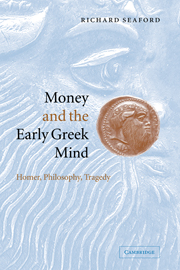Book contents
- Frontmatter
- Contents
- Preface
- List of abbreviations
- 1 Introduction
- PART ONE THE GENESIS OF COINED MONEY
- PART TWO THE MAKING OF METAPHYSICS
- 9 Did politics produce philosophy?
- 10 Anaximander and Xenophanes
- 11 The many and the one
- 12 Heraclitus and Parmenides
- 13 Pythagoreanism and Protagoras
- 14 Individualisation
- 15 Appendix: was money used in the early Near East?
- References
- Index
14 - Individualisation
Published online by Cambridge University Press: 22 September 2009
- Frontmatter
- Contents
- Preface
- List of abbreviations
- 1 Introduction
- PART ONE THE GENESIS OF COINED MONEY
- PART TWO THE MAKING OF METAPHYSICS
- 9 Did politics produce philosophy?
- 10 Anaximander and Xenophanes
- 11 The many and the one
- 12 Heraclitus and Parmenides
- 13 Pythagoreanism and Protagoras
- 14 Individualisation
- 15 Appendix: was money used in the early Near East?
- References
- Index
Summary
INDIVIDUALISM
Reciprocity performs the exchange of goods and services by means of lasting interpersonal attachment, in which the identity of the donor may remain associated with his gift (10b). In centralised reciprocity (redistribution) tradition and interpersonal attachment (for instance of labourer to king or to god) are still at the heart of the economy, albeit supported by custom or by fear. Barter involves some impersonality in the exchange, and some autonomy for the exchangers, but tends nevertheless to require lasting (and sometimes ritualised) personal relationships sanctioned by custom and characteristic of reciprocity. The Greek animal sacrifice involves reciprocity (something in return may be expected of the deity) and redistribution (meat brought to the god is eaten by all), but also the horizontal relation of egalitarian communality between the participants: there must be equal shares for all (3a). It was this traditional, sanctified equality that we saw as a factor in that communal confidence in multiple symbols of identical value that is a prerequisite for the communal adoption of coinage. Aristotle will observe that currency (nomisma), by creating commensurability in exchange, makes possible communality (koinōnia) of equals (qua transactors).
The result is a paradox. For its beginnings coined money owed something to (sacrificial) interpersonal solidarity, but when it became a general means of payment and exchange it must have greatly increased such impersonality and personal autonomy as were present in earlier forms of exchange. Money tends to promote the autonomy of the individual.
- Type
- Chapter
- Information
- Money and the Early Greek MindHomer, Philosophy, Tragedy, pp. 292 - 317Publisher: Cambridge University PressPrint publication year: 2004



